
The Shining Path, self-named the Communist Party of Peru, is a far-left political party and guerrilla group in Peru, following Marxism–Leninism–Maoism and Gonzalo Thought. Academics often refer to the group as the Communist Party of Peru – Shining Path to distinguish it from other communist parties in Peru.

The Túpac Amaru Revolutionary Movement was a Peruvian Marxist-Leninist guerrilla army which started in the early 1980s. Their self-declared goal was to demonstrate to leftist groups in Peru that sought change through the current government the viability of radical revolution. The MRTA also aimed to provide an alternative to another militant group, the Shining Path, which placed them in direct competition. The group was led by Víctor Polay Campos until he was sentenced to 32 years' imprisonment in 1992 and by Néstor Cerpa Cartolini until his death in 1997.

Manuel Rubén Abimael Guzmán Reynoso, also known by his nom de guerreChairman Gonzalo, was a Peruvian Maoist guerrilla leader and convicted terrorist. He founded the organization Communist Party of Peru – Shining Path (PCP-SL) in 1969 and led a rebellion against the Peruvian government until his capture by authorities in 12 September 1992. He was subsequently sentenced to life imprisonment for terrorism and treason.

The Tarata bombing, known also as the Miraflores bombing or Lima bombing, was a terrorist attack carried out in Tarata Street, located in Miraflores District of Lima, Peru, on 16 July 1992, by the Shining Path terrorist group. The blast was one of the deadliest Shining Path bombings during the Internal conflict in Peru and was part of a larger bombing campaign in the city during the last stage of the terrorism era.
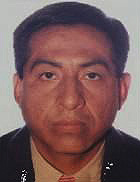
Florindo Eleuterio Flores Hala is a former leader of the Peruvian Maoist terrorist group Shining Path. He was captured by a combined force of the Peruvian Army.
Óscar Ramírez Durán, commonly known as Comrade Feliciano, is a Peruvian convicted terrorist and former political leader who led the Shining Path, a Marxist–Leninist–Maoist terrorist group in Peru, in the 1990s.

The Peruvian conflict is an ongoing armed conflict between the Government of Peru and the Maoist guerilla group Shining Path and its remnants. The conflict began on 17 May 1980, and from 1982 to 1997 the Túpac Amaru Revolutionary Movement waged its own insurgency as a Marxist–Leninist rival to the Shining Path.
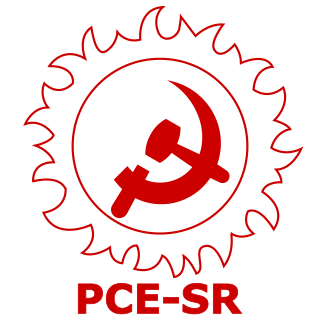
The Communist Party of Ecuador – Red Sun, also known as Puka Inti is a Marxist–Leninist–Maoist political party and guerrilla group in Ecuador. It was founded on 1 June 1993. From inception, until their death, the group's former leader used the nom de guerre "Comrade Joselo". Joselo died on November 6, 2022 with no announcement of a successor. The PCE-SR consists mostly of former members of the underground leftist group ¡Alfaro Vive, Carajo! The organization follows the ideas of the Peruvian communist leader Abimael Guzmán, founder and longtime chairman of the Shining Path in Peru. The organization has also become close to Mantaro Red Base Committee, and the Communist Party of India (Maoist), and is also a member of the International Communist League (Maoist).
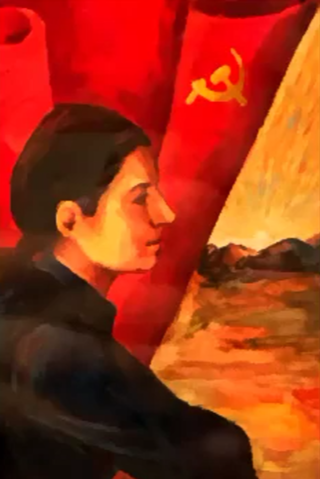
Augusta Deyanira La Torre Carrasco, also known as Comrade Norah, was a Peruvian communist, recognized as the number two in command of Shining Path. La Torre's influence on her husband, Shining Path founder Abimael Guzmán, is credited with establishing equality for women with regard to participation within the revolutionary organization, and during its militant actions.
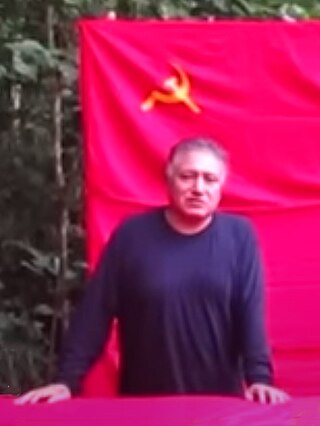
Comrade José is a Peruvian communist militant, leader of the Militarized Communist Party of Peru, an offshoot of the Marxist–Leninist–Maoist guerrilla Shining Path. The group is present in the VRAEM region.
Marxism–Leninism–Maoism (MLM) is a political philosophy that synthesizes and builds upon Marxism–Leninism and the thought of Mao Zedong. Marxism–Leninism–Maoism was first formalized by the Shining Path in 1982.
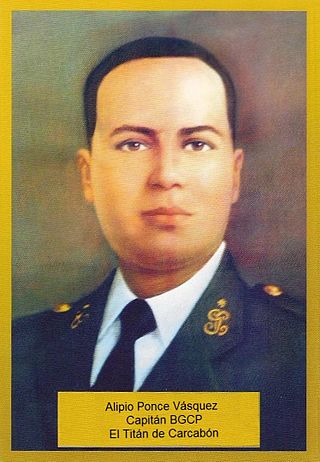
Alipio Ponce Vásquez was a Peruvian police officer who fought and died during the 1941 Ecuadorian–Peruvian War.

Mariano Gagnon was an American Franciscan friar and Catholic priest, who served as a missionary in Peru. Gagnon founded the Cutivereni mission in Peru's Ene River valley to assist the indigenous Asháninka people who were being forced out of their homes in the jungle by settlers. He would later become known for his work helping arm the Asháninka and eventually helping some Asháninka flee Cutivereni when it was facing attack from Shining Path guerrillas during the internal conflict in Peru. He later wrote about his experiences during the conflict in the book Warriors in Eden.

Peru's Truth and Reconciliation Commission was a truth and reconciliation commission established by President Alejandro Toledo to investigate the human rights abuses committed during the internal conflict in Peru between 1980s and 1990s. The TRC was a response to the violent internal conflict between 1980 and 2000 during the administration of Presidents Fernando Belaúnde (1980–1985), Alan García (1985–1990), and Alberto Fujimori (1990–2000). The commission's mandate was to provide a record of human rights and international humanitarian law violations committed in Peru between May 1980 and November 2000, as well as recommend mechanisms to promote and strengthen human rights. The TRC reported on the estimated 70 000 deaths, assassinations, torture, disappearances, displacement, employment of terrorist methods and other human rights violations executed by the State, Shining Path, and the Túpac Amaru Revolutionary Movement. The report concluded that there is both institutional and individual accountability, as well as identifying racial and cultural factors that became a catalyst for conflict.
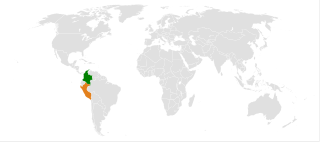
Colombia–Peru relations are the bilateral relations between Colombia and Peru. Both nations are members of the Community of Latin American and Caribbean States, Lima Group, Organization of Ibero-American States, Organization of American States, Pacific Alliance and the United Nations.
The Lost Decade or the Crisis of the 80s was a period of economic stagnation in Peru throughout the 1980s which was exacerbated to a severe macroeconomic crisis by the end of the decade. Foreign debt accumulation throughout Latin America, a series of natural disasters, mass public expenditures, nationalizations of banks and financial institutions, and the shutting of Peru out of international credit markets led to a decade of macroeconomic decline. The financial crisis soon became adopted into the public sphere through hyperinflation in commodities, food shortages, and mass unemployment. By the end of the decade, Peru's gross domestic product (GDP) contracted over 20%, and poverty rose to 55%.

The San Miguel del Ene attack was a massacre on 23 May 2021 in San Miguel del Ene, a rural area in the Vizcatán del Ene District of Satipo Province in Peru, in which 18 people were killed. The massacre was most likely perpetrated by the Militarized Communist Party of Peru (MPCP), a split of the Maoist terrorist organization Shining Path. The attack occurred in the Valle de los Ríos Apurímac, Ene y Mantaro (VRAEM) conflict region, where the group operates.

The Militarized Communist Party of Peru is a political party and militant group in Peru that follows Marxism–Leninism–Maoism and participates in the communist insurgency in Peru. It is considered a terrorist organization by the government of Peru. The MPCP operates primarily in the VRAEM area and is involved in the area's coca production. Comrade José has been the leader of the MPCP since its official creation in 2018 after its final split from the declining Shining Path guerilla group.
Women in the Internal conflict in Peru were active in a large variety of roles, both making significant impacts on the Conflict and with the Conflict having significant impacts on them. Post-conflict women, especially Indigenous women, have played major roles in reconciliation efforts.
On December 6, 1988, Juan Carlos Vega Llona was assassinated one block away from the Peruvian embassy in the district of Cotahuma, La Paz, Bolivia, by armed members of the fictitious "Revolutionary Workers Movement", created in name by Shining Path, a Peruvian terrorist organisation. The murder of the embassy's naval attaché was carried out in reprisal for the Peruvian prison massacres that took place two years prior.















